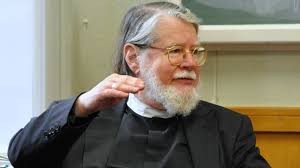Robert Jenson and the search for the divine feminine
Jens was never unkind to me, perhaps because I was the rare chemistry major who asked questions about God while showing enthusiasm for Barth.

When I heard that theologian Robert W. Jenson had died, the first memory that came to mind was a chapel sermon I heard him preach when I was a student at St. Olaf College and he was on the faculty. It was a beautifully poetic and theologically grounded sermon about God’s absolute transcendence. Jenson delivered the sermon extemporaneously, but it was eloquent and focused. There was a moment, though, when he got off track. He mentioned an upcoming conference on campus called “The Search for the Divine Feminine.” And I’ll never forget what he said next: “The search for the divine feminine is like the search for the divine beetle or the divine crocodile. It doesn’t exist!” My pew-mates and I laughed while raising our eyebrows at one another.
I liked Jens. I never took a class from him, but I visited his office hours and talked with him about theology on occasion. He was always quite certain about his opinions (how could one publish 1200 pages called Christian Dogmatics and not be certain?), but in a way that I found funny rather than intimidating. “There’s a God-shaped hole in process theology” he said gruffly one time when I mentioned that I was reading about process theology for one of my classes, and then he continued: “The dangerous thing about process theology is that it’s such an attractive alternative to Christianity.” I wasn’t bothered by these statements because I had no personal stake in defending or embracing process theology. And Jens was never unkind to me, perhaps because I was the rare chemistry major who asked questions about God while showing enthusiasm for Barth.
But some of Jenson’s students were not so lucky. One former student recalls asking Jenson about theology in relation to LGBT issues. The incident happened over 20 years ago, but the former student still remembers Jenson’s exact response. It’s too crude for me to print here, but a polite paraphrase would be “gay people are more disgusting than what I’m about to go put in the toilet.” Jenson relished using polemical language, particularly around issues of sexuality and gender, and he spoke to some students in a way that was demeaning and obscured the idea of imago dei. He could be irascible, and his combination of certainty and bluntness caused words to come out of his mouth that some would call abusive. His snarky comment about the divine beetle and the divine crocodile pales in comparison.
I was thinking about all of this at home a few nights ago when my six-year-old daughter pointed to a book she saw on one of my shelves and asked: “what’s that book about?” It was Sexism and God-Talk. I told her about Rosemary Ruether and explained what sexism is and how it relates to the language we use for God. “So that’s why when I talk to you about God I use the pronoun she,” I concluded. “Most people call God he, so I try to balance that out using she. But of course God isn’t really male or female.”
“I know, mommy,” my daughter replied with certainty. “God isn’t a he or a she. God’s an it. Like a chair, or a cloud, or a . . . noun.” Resisting the urge to pull Martin Buber off the shelf, I agreed with her. “Well, yes,” I said. “I guess God is a noun. You can call God it if you want to.”
Then I thought again about Jenson’s chapel sermon. The idea of the divine feminine had been so offensive to him that he’d had to publicly ridicule it. But what if his emphasis was on the wrong thing? What if the main point of the conference was the search? What if we can’t pin God down with certainty and that’s why we keep trying, century after century, to find new ways to talk about God? What if, as theologian Jacob Erickson says, the God-shaped hole in process theology is apophatic, a place that leaves room for divine mystery? What if God is calling even the most certain among us to take up a posture of generosity—embodying a stance of searching, open to being changed—when we encounter people whose beliefs challenge our own?
Jenson’s theology has been a gift to the church, and it’s with joy on his behalf that I imagine he’s now seeing God face to face. Whether he sees a bit of the divine feminine or the divine beetle remains, for now, a mystery to us. In any case, for Jenson the search is now over.





